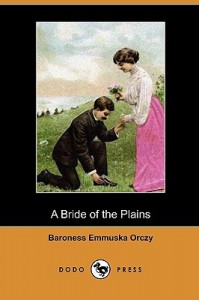A Bride of the Plains
 Read in an e-version. This is Baroness Orczy's nod to her own land of birth, Hungary, but it is not a tale of the aristocrats from whom she sprang, but a tale of the peasants, and it is just as patronizing and sentimental as you might expect.
Read in an e-version. This is Baroness Orczy's nod to her own land of birth, Hungary, but it is not a tale of the aristocrats from whom she sprang, but a tale of the peasants, and it is just as patronizing and sentimental as you might expect. Sigh. Orczy writes such insipid female characters. Even Marguerite, who is meant to be a proper foil and match for the intrepid Sir Percy Blakeney, is endlessly a victim and in peril. But Elsa, the Bride of the title, is truly a victim in every possible way - she is the victim of domestic tyranny at home, and consents meekly to being married off to a very nasty man who, it is clear, will abuse her. She's also animated almost entirely by virtue and duty, and her few passing moments of rebellion (and, some might say, common sense) are submitted to the priest, who, of course, persuades her that she has to submit to the males in her life. Even at the end, when she discovers that her hero and lover, miraculously returned from the wider world on the eve of her marriage, has had an uncomfortably ambiguous role in the murder of the prospective husband, rather than sticking to her moral guns (as she has throughout the novel to the reader's endless frustration), she shrugs away her ability to judge.
The Awful Counter-Example to Elsa's submissiveness is Klara, just as frequently known as The Jewess, who is a flirt and the preferred company of Elsa's revolting husband to be, Bela. Orczy pulls out all the stops in making him revolting, by the way, giving him one eye and absolutely no redeeming qualities. She certainly makes sure we rejoice in his murder. For Klara, we are permitted to feel a little sympathy, because she too is victimized by the males in her circle, most particularly her father. The casual anti-Semitism of the novel is of course disturbing to the modern reader; in Orczy's partial defense, this novel was published in 1915; my Hungarian history is so non-existent that I cannot place the intended epoch of its actual setting, though there is quite a lot of political content in the first few chapters, mostly condemnation of compulsory military service.
There are two redeeming features for me: despite my despair over the spinelessness of her females, Orczy is an accomplished sentimental novelist, and draws me along through their emotional states. And although she has a tendency to repeat herself, she is quite a skilful word-painter of scenery, and a passage like her opening description of the plain is full of pleasures.
Sir Percy has nothing to worry about, though!



